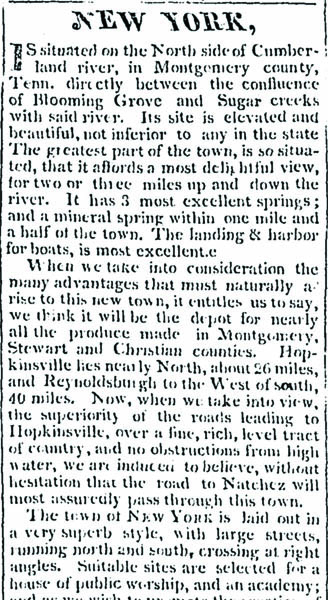Tennessee history for kids
Volunteer State towns that failed to launch

You see, towns didn’t just magically appear in early Tennessee. Somewhere along the way, a developer organized them, laid out streets, subdivided lots, and announced the creation of the towns in newspaper advertisements.
I’ve found ads announcing the creation the town of Maryville (1795), Columbia (1818), Memphis (1820), Dyersburg (1825), Harriman (1889) and many others.
Most of them sound similar. They say why the town will become a hub of commerce and lead to prosperity for everyone who moves there.
I think my favorite is Nolensville, because it made the audacious claim that people who lived there were less likely to die.
“Nolensville is situated in Williamson County,” said an ad in the October 1818 Tennessee State Gazette. “Three excellent springs entirely convenient, and as healthy as any part of the world. As proof, the present proprietor has lived on the spot for 20 years and raised up a family of 15 children without a single death.”
Some of these developers made money and organized communities that are still there today. Some did not, organizing towns that vanished from the map a long time ago, such as Randolph (Tipton County), Dallas (Hamilton County), Washington (Rhea County), and Columbus (Bradley County). I would describe these four communities as “ghost towns,” which means they once existed; they once had churches, commerce, etc., but don’t anymore.
However, some of the towns I’ve found announcements for apparently never got off the ground in the first place. Here are three examples:
In June 1819, the Nashville Whig announced the creation of New York, a town in Montgomery County to be located on the north side of the Cumberland River. According to the ad, the site was beautiful, and had three springs and an excellent harbor.
“Merchants would do well in visiting this eligible site and vesting part of their capital in lots,” the ad said.
According to the ad, the town of New York had five developers – the most prominent of whom was U.S. Rep. Henry H. Bryan.
In 1821, the Whig announced that an academy had been organized in New York, which offered instruction in reading, writing, rhetoric, map reading and languages, among other subjects.
The first year, the academy was led by F.R Cossit; the second, by J. Voorheis.
New York even made it to Matthew Rhea’s 1832 map of Tennessee – just downstream and across the Cumberland River from Palmyra.
However, I can find very little mention of New York, Tennessee, other than these brief signs of its existence. The only clue remaining that the community ever existed is a road called York Landing Road.
Meanwhile, there were two attempts to create a Tennessee town called Jackson. We are familiar with the one that succeeded, in Madison County. But what about the other (theoretical) town of Jackson?
In September 1818, the Nashville Whig contained a large ad in which Joseph and Richard Royall announced the creation of a town called Jackson on the Duck River.
“Of the present crop there will not be less than 600 hogsheads of tobacco shipped from this place and its vicinity to New Orleans,” the ad boasted. The article said the town of Jackson would be located on the river’s north bank, near the boundary between Maury and Bedford counties (Marshall County did not exist yet). Based on this description, my best guess is that the ad refers to land at or near the present location of Henry Horton State Park.
In any case, this attempt to form a town called Jackson must have failed immediately, because the West Tennessee town of Jackson was already organized by 1822. Richard Royall later moved to Texas.
A third example of a town that “failed to launch” was in present-day Benton County.
In 1821, Joshua Williams organized a town called Williamsville, across the Tennessee River from Reynoldsburg, in what was then Humphreys County.
“Its mercantile advantages are very great,” the ads claimed. “It is also the main crossing place from the eastern part of the state to the Chickasaw Bluffs.”
Williamsville must have really bombed as a real estate venture. I found it mentioned a couple of times as a stagecoach stop, but I can’t find the place on a single map of Tennessee.
Bill Carey is the founder of Tennessee History for Kids, a nonprofit organization that helps teachers cover social studies.

